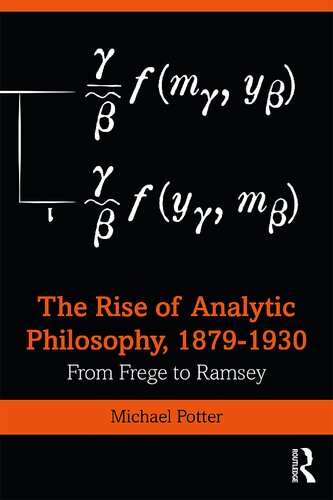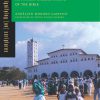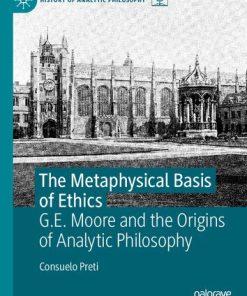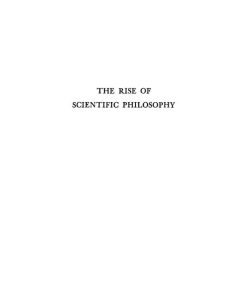The Rise of Analytic Philosophy 1879 1930 From Frege to Ramsey 1st Edition by Michael Potter ISBN 9781138015135 113801513X
$50.00 Original price was: $50.00.$25.00Current price is: $25.00.
The Rise of Analytic Philosophy 1879 1930 From Frege to Ramsey 1st Edition by Michael Potter – Ebook PDF Instant Download/Delivery: 9781138015135 ,113801513X
Full download The Rise of Analytic Philosophy 1879 1930 From Frege to Ramsey 1st Edition after payment

Product details:
ISBN 10: 113801513X
ISBN 13: 9781138015135
Author: Michael Potter
The Rise of Analytic Philosophy 1879 1930 From Frege to Ramsey 1st Edition Table of contents:
Part I Frege
1 Biography
2 Logic before 1879
Stoic logic
Aristotelian logic
Supposition
Kinds of entity
Relations
Transcendental logic
Empiricism and idealism
Boole
3 Begriffsschrift I: Foundations of Logic
The aim of the concept-script
The judgment stroke
The content stroke
Axioms, basic laws and rules
Tone and conceptual content
Function and argument
Greek and Latin letters
4 Begriffsschrift II: Propositional Logic
Syntax
Semantics
Rules and basic laws
5 Begriffsschrift III: Quantification
Syntax
Semantics
Rules and basic laws
6 Begriffsschrift IV: Identity
Syntax
Semantics
Basic laws
7 Begriffsschrift V: The Ancestral
Defining the ancestral
Logic as non-trivial
Impredicativity
8 Early Philosophy of Logic
Psychologism and empiricism
Judgment and truth
Defining the scope of logic
Metalogic
9 The Hierarchy
Levels
Applications
Concept and object
Objecthood and identity
10 Grundlagen I: The Context Principle
Semantic incompleteness
The Lockean model
Concept and object again
11 Grundlagen II: Arithmetical Truth
Game formalism
Leibniz
The a posteriori
Analytic or synthetic?
12 Grundlagen III: Numbers
Numbers of what?
Numbers as non-linguistic
Numbers as objects
Numbers as self-subsistent
Numbers as non-actual
Numbers as objective
Numbers as abstract
Numbers as logical
13 Grundlagen IV: The Formal Project
Numerically definite quantifiers
Hume’s Principle
Section 64
Deriving arithmetic
The Julius Caesar problem again
Other definitions
14 Sense and Reference I: Singular Terms
Rejection of the Begriffsschrift theory
The sense of a singular term
Names and descriptions
Internalist and externalist conceptions of sense
15 Sense and Reference II: Sentences
The reference of a sentence
Thoughts
Referring to thoughts
16 Sense and Reference III: Concept-Words
Unsaturated senses
Concepts
The concept horse
17 Grundgesetze I: Types
Syntax
Semantics
Wittgenstein’s objection again
Truth and taking as true
18 Grundgesetze II: Extensions
Extensions and value-ranges
Semantics
The contradiction
Logical objects again
19 The Frege–Hilbert Correspondence
The Foundations of Geometry
Deductivism
Uniqueness
Existence and consistency
Frege’s 1906 definition
20 Late Writings
The structure of the realm of reference
Thought and language
Sameness of sense
Indexicals
Idealism
21 Frege’s Legacy
Logic
Language
Mathematics
Part II Russell
22 Biography
23 Bradley
Absolute idealism
Russell’s conversion
24 Geometry
Metric geometry
First deduction of metric geometry
Second deduction of metric geometry
Dimension
Geometry and physics
Deduction of descriptive geometry
Public and private space
25 McTaggart
The Tiergarten programme
The paradoxes of relativity
26 German Mathematics
The continuum
The infinitely large
Mathematical education
27 Whitehead
Universal Algebra
A single paradox of relativity
A wrong turning?
28 Moore
The existential theory of judgment
Thing and concept
The refutation of idealism
Against Kant?
Moore’s influence
29 Leibniz
Analyticity and necessity
External relations
The paradox of relativity resolved
Matter and position again
30 Peano
Classes
Relations
The 1900 draft of the Principles
Logic and abstraction
31 Early Logicism
Russellian logicism
Characterizing logic
Knowledge of logic
32 Denoting Concepts
The variable
Indefinite denoting concepts
Definite denoting concepts
Epistemology
33 The Contradiction
The paradoxes
Types
Reducibility
34 On Denoting
The Gray’s Elegy argument
Against Frege?
The new theory of denoting phrases
Scope
Non-entities
Significance
The substitutional theory
35 Truth
The coherence theory
The pragmatist theory
The primitivist theory
The correspondence theory
36 Types
The hierarchy of propositional functions
The axiom of reducibility
Identity
37 Middle Logicism
Continuities
The vicious circle principle
The universality of logic
Classes as fictions
The regressive method
Logical truth
38 Acquaintance
Particulars
Complexes
Universals
The variable
The self
39 Matter
On the notion of cause
Inference and construction
The constructional base
Public and private space
40 Pre-war Judgment
The 1906 theory and the Frege point
The 1909 theory and the ontology of the Introduction
The 1911 theory and the direction problem
The 1913 theory and the verb
The existential proposal
Permutative complexes
Judging a nonsense
41 Facts
Complex and fact
Negative facts
General facts
Names and particulars
Forms and universals
42 Late Logicism
The subject matter of logic
The new theory of types
Propositions are not names
Bipolarity and truth
Logic and necessity
43 Post-war Judgment
Language and vagueness
Rejecting the subject
Meaning
The feeling of belief
44 Neutral Monism
Adopting neutral monism
A second wave?
The inference from percepts to events
Emergence
45 Russell’s Legacy
The demise of absolute idealism
The external world programme
Logicism
Naturalism
Cambridge analysis
Ordinary language philosophy
Later reception
Part III Wittgenstein
46 Biography
47 Facts
Facts
Atomic facts
Molecular facts
48 Pictures
Meaning
Truth
Relative inexpressibility
Possibility
49 Propositions
Logical form
Sign and symbol
Absolute unsayability
Wittgenstein’s context principle
50 Sense
Truth-possibilities
Tautology and contradiction
Independence
The general form of proposition
51 Wittgenstein’s Concept-Script
The N-operation
Propositional variables
Direct enumeration
Propositional functions
Formal series
Wittgenstein’s vicious circle principle
52 Objects
Simplicity and elementary propositions
The argument for substance
Components
Forms of object
Thought and world
53 Identity
Wittgenstein’s argument
Doing without identity
Identity and classes
54 Solipsism
The argument for solipsism
The thinking subject
55 Ordinary Language
Vagueness
Austerity
Philosophy
56 Minds
Judgment
The empirical subject
Logic and psychology
Theory of knowledge
57 Logic
The propositions of logic
Logic as transcendental
58 The Metaphysical Subject
The eye and the visual field
The a priori order
Talking of the I
59 Arithmetic
Numbers
Dependence on infinity
60 Science
The mesh
Principles
The independence of the will
61 Ethics
Moral nonsense
The willing subject
The lecture on ethics
Religion
62 The Mystical
The riddle
Quietism
The dialectical reading
The resolute reading
The frame
The preface
63 The Legacy of the Tractatus
The independence of elementary propositions
The shape of space
Atomism
The picture theory
Philosophy
Part IV Ramsey
64 Biography
65 Truth
Propositions
Truth
Expressing and describing
Reverse semantics
66 Knowledge
Reliabilism
Induction
Human logic
67 The Foundations of Mathematics I: Types
Ramsey’s simple hierarchy
Saying the unsayable
A transcendental argument
68 The Foundations of Mathematics II: Logicism
Propositional functions in extension
Wittgenstein’s objections
The demise of the transcendental argument
69 Universals
Incompleteness
Narrow and wide ranges
Complex universals
Unigrade and multigrade terms
70 Degrees of Belief
Logical probabilities
Betting
Synchronic Dutch books
Diachronic Dutch books
Degrees of belief and frequencies
Partial belief and desire
71 Facts and Propositions
Chicken beliefs
Partial belief and chickens
72 Last Papers
Laws
The Ramsey test
Causation
Theories
73 Ramsey’s Legacy
Truth and meaning
Logicism
Universals
Bibliography
Index
People also search for The Rise of Analytic Philosophy 1879 1930 From Frege to Ramsey 1st Edition:
the rise of rhetoric and the decline of everything else
rise and development of analytic philosophy
the rise of analytic philosophy
a philosophical movement in the 18th century
a brief history of analytic philosophy
Tags: Michael Potter, Rise, Analytic Philosophy, Frege, Ramsey
You may also like…
History - Military History
Politics & Philosophy - Social Sciences
The Philosophy of Social Science 2nd Edition by Garry Potter 9781317331841 1317331842
Housekeeping & Leisure - Floral & Nature Crafts
Flower Philosophy Seasonal Projects to Inspire Restore Anna Potter
Politics & Philosophy - Philosophical Positions & Movements
The Metaphysical Basis of Ethics G E Moore and the Origins of Analytic Philosophy Consuelo Preti
Politics & Philosophy - General & Miscellaneous Philosophy
Science (General) - Theories of Science
Uncategorized
Politics & Philosophy - Sociology
The Philosophy of Social Science New Perspectives 2nd Edition Garry Potter











